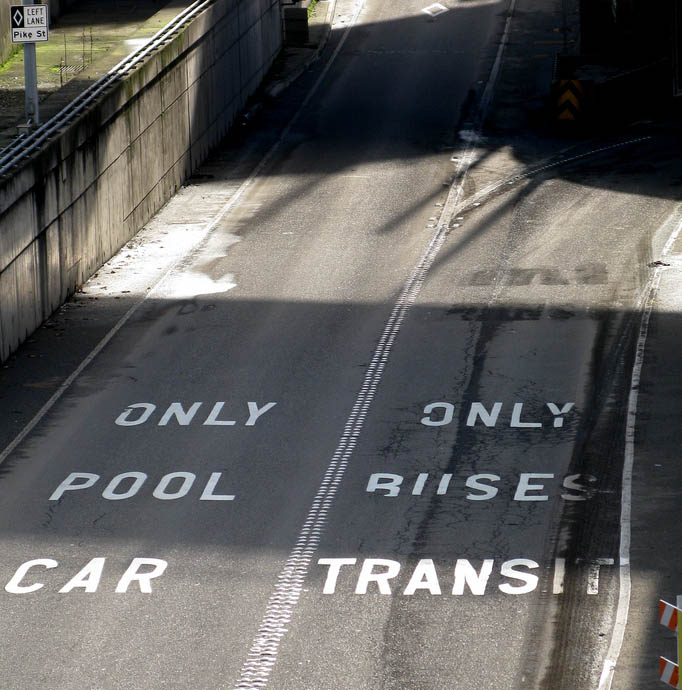UPDATE: We've summarized much of the series this article is part of in a new report, Policies for Shareable Cities: A Sharing Economy Policy Primer for Urban Leaders. Get your free copy here today.
Empty car seats at rush hour are a huge waste of transportation resources. What can a city government do to actively encourage ridesharing and significantly reduce traffic in cities? One partial remedy has been offered by the rise of online rideshare matchmaking sites like Craigslist, 511.org, Zimride, and GoLoco.

In Orange County, California, the freeway features two carpool lanes and six regular traffic lanes. Photo credit: Ernesto Andrade. Used under Creative Commons license.
However, there are many steps that a city could take to incentivize and facilitate ridesharing. Here are a few ideas:
-
Designate casual carpool pick-up spots: In Oakland, California, people line up at a handful of locations in the mornings to get in cars with strangers and ride across the Bay Bridge to San Francisco. This trend – sometimes called casual carpooling or slugging – has arisen somewhat organically in a handful of cities where traffic clogs the daily commute. Cities can aid the trend by designating certain safe areas as rideshare pick up spots.
-
Design more park-and-ride lots for ridesharing: Even if ridesharing is not possible for one’s entire commute, it is still possible to park and consolidate into fewer vehicles. Park-and-ride lots can aid rideshares by providing a meet-up location. A commuter might drive a few miles from home to the park-and-ride lot, then get in the car with others for the duration of the commute. Cities do not even need to build new parking spots, but could contract with parking lots that are typically not used during weekdays, such as church parking lots.
-
Create more carpool lanes and waive tolls to incentivize ridesharing: An incentive for many casual carpoolers is that carpools (often defined as three or more passengers) can take advantage of quicker carpool lanes and can breeze through some toll plazas without paying. This is an important incentive system for encouraging ridesharing.
-
Designate or give discounted parking spots or parking permits to registered carpools: City-owned parking lots could create designed or discounted parking spots for registered cars that regularly bring four or more people to work. For example, the University of California, Berkeley, has special discounted parking permits for registered carpools.
-
Create a Guaranteed Ride Home program: Many people choose not to carpool because they feel insecure about the fact that they cannot leave work at any time. Cities and regions with Guaranteed Ride Home Programs give carpoolers peace of mind by covering the cost of a few taxi rides or rental cars in the event that a carpooler has an emergency and needs to leave work early.
-
Designate taxi-sharing stands: In theory, taxi-sharing stands would aid people greatly in finding partners to share a cab ride. New York City designated taxi-sharing stands a couple of years back, although it would be interesting to look more closely at this program to determine why it actually had low ridership.
-
Prioritize good old-fashioned public transportation: Ultimately, a clean, safe, and reliable public transportation system will likely go the furthest in reducing our reliance on cars.
How else might a city foster ridesharing? Please post your thoughts below and help us build this collection of policy proposals. Thank you!
This post is one of 15 parts of our Policies for a Shareable City series with the Sustainable Economies Law Center:
- Car Sharing and Parking Sharing
- Ride Sharing
- Bike Sharing
- Shareable Commercial Spaces
- Shareable Housing
- Homes as Sharing Hubs
- Shareable Neighborhoods
- Shareable Workspaces
- Recreational and Green Spaces
- Shareable Rooftops
- Urban Agriculture
- Food Sharing
- Public Libraries
- The Shareable City Employee
- How to Rebuild the City as a Platform









